The Professional Commercial Zero Turn Buying Guide
Buying a commercial lawn mower is a big decision and an even bigger investment for your landscaping business. The right mower may save you time and money and can take your business to the next level.
To help you buy the right commercial lawn mower for your crew, we’ve broken down what you should know about purchasing a commercial lawn mower.
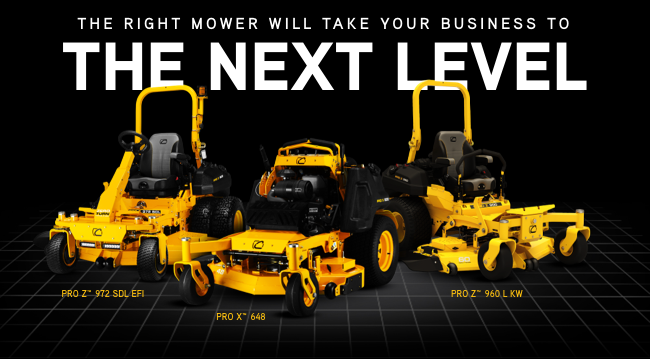 Table of Contents
Table of Contents
- Types of Commercial Lawn Mowers
- Lap Bar or Steering Wheel: Which is Right for You?
- The Benefits of Stand-On Mowers
- Key Factors to Consider When Buying a Commercial Lawn Mower
- Commercial Lawn Mower Accessories to Consider
- Commercial Lawn Mower Buying Advice
- Frequently Asked Questions
- Commercial Lawn Mower Maintenance Schedule
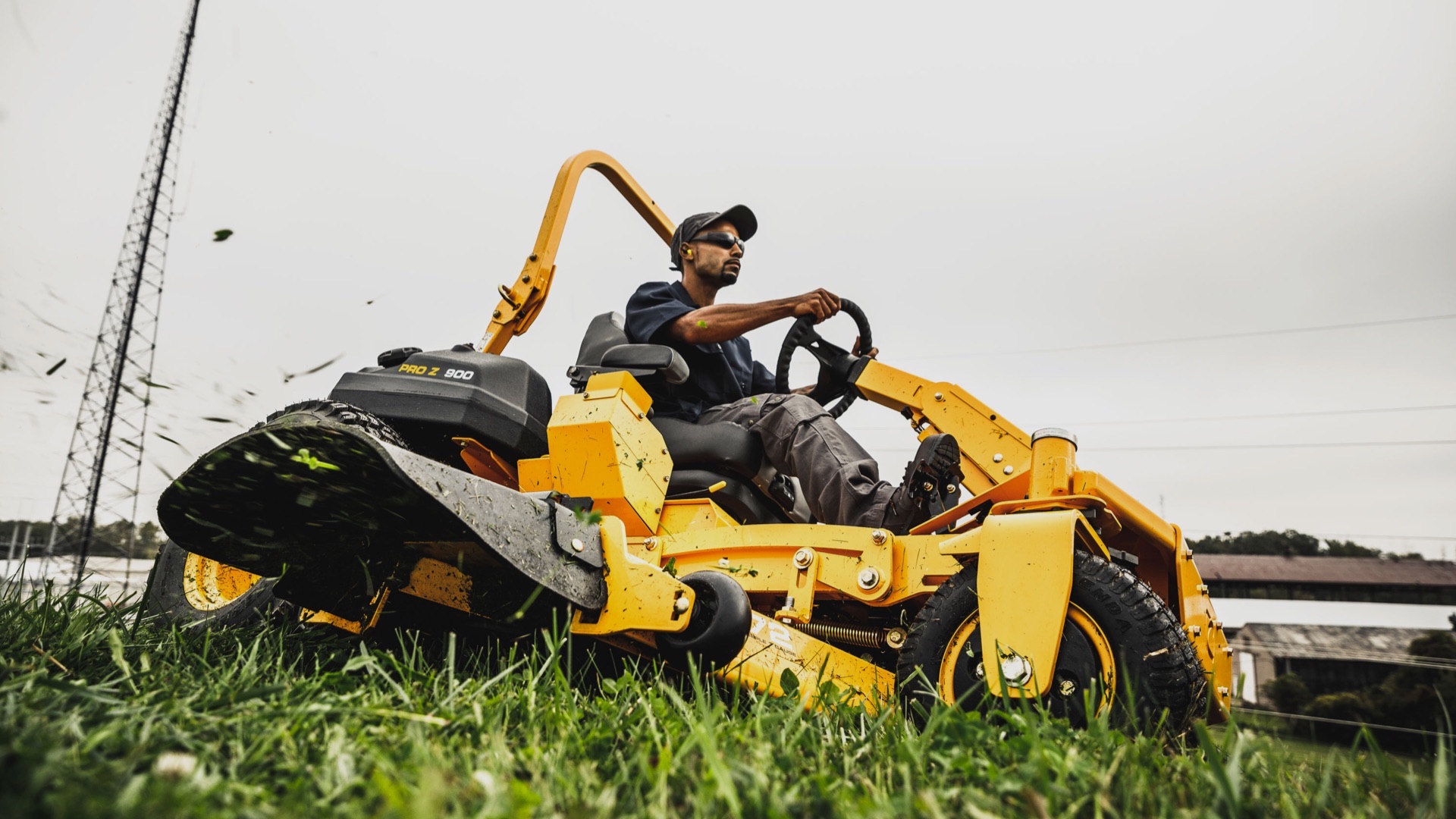 Types of Commercial Lawn Mowers
Types of Commercial Lawn Mowers
There are three types of commercial lawn mowers to consider: ride-on zero-turn mowers, stand-on zero-turn mowers and walk-behind mowers.
Each mower type offers varying features and benefits, so the decision on which is best for your business depends on a variety of factors that we’ll explore throughout this buying guide.
Ride-On Zero-Turn Mowers
Made to handle large jobs with speed and efficiency, commercial ride-on zero-turn mowers come equipped with a range of deck sizes. For example, Cub Cadet® deck sizes range from 54 inches to 72 inches. Commercial ride-on zero-turns also offer the convenience and comfort of being seated while working, and are fitted with lap bar or steering wheel control options.
Stand-On Zero-Turn Mowers
Built for excellent control in small spaces, stand-on zero-turn mowers offer the best of both worlds for landscapers who need a powerful commercial machine that efficiently navigates obstacles and tight turns. A commercial stand-on mower also provides the operator a good vantage point and comfort when mowing. More on the benefits of stand-on zero turn mowers below.
Walk-Behind Mowers
Walk-behind commercial mowers offer the operator excellent control, specifically on slopes and varying terrains, and are effective for smaller jobs with a lot of obstacles and tight turns. Walk-behind commercial mowers can help get into tight spaces and offer easy maneuverability for the efficiency to get the job done.
Lap Bar or Steering Wheel: Which is Right for You?
The commercial ride-on zero-turns are a popular choice with landscapers due to their speed and productivity on large properties. For a long time, these zero-turns exclusively featured lap-bar steering but the introduction of zero-turns with steering wheel control has changed that.
So, should your commercial zero-turn mower have a lap bar or a steering wheel? Here’s what you should know about each option:
Lap Bar
If you’re buying a commercial lawn mower for large, flat properties, then lap-bar steering is a solid option to get the job done with speed, power and efficiency.
How does a mower lap bar work? The lap bar controls the mower’s rear wheels while the front wheels are casters (like a shopping cart), designed to allow for tight, controlled turns. Pushing the bars away from your body moves the mower forward while pulling them toward your body reverses the machine. To turn, think of the handles like those on a bike: to turn left, you move your left hand toward you while pushing the right away from you and you do the opposite to turn right.
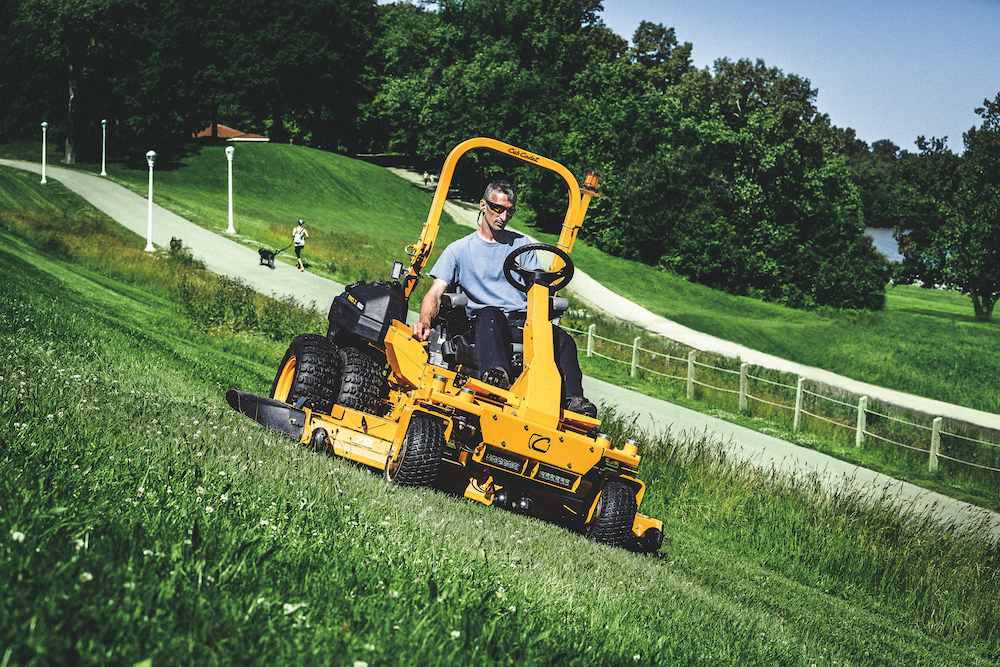
Steering Wheel
The steering-wheel controlled zero-turn is a good alternative for landscapers as it controls all four of the mower’s wheels, which offers these advantages:
- Straight-line ability on a variety of terrain, providing little overlap
- Good stability and confident control
- Easy training on a familiar steering wheel
The PRO Z™ Series, Cub Cadet’s lineup of commercial zero-turn mowers, is equipped with steering wheel technology that is designed to deliver elite control on tough jobs.
The Benefits of Stand-On Mowers
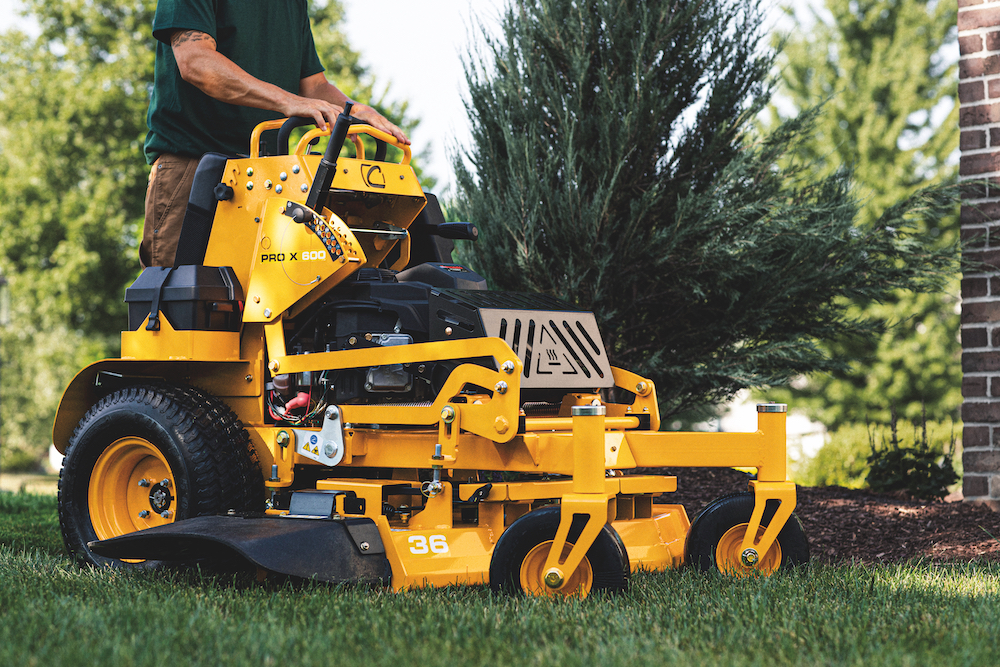 As mentioned above, commercial stand-on zero-turns offer landscapers a powerful machine with excellent control designed to maneuver well in a yard’s tight spaces and around clustered obstacles like trees, plants and gardens.
As mentioned above, commercial stand-on zero-turns offer landscapers a powerful machine with excellent control designed to maneuver well in a yard’s tight spaces and around clustered obstacles like trees, plants and gardens.
The Cub Cadet® lineup of PRO X Series stand-on zero-turns are equipped with the features you need to get the job done.
- Compact size means easy transport and storage
- Large three-position spring suspension platform
- Easy step-on/step-off design
- Fabricated 10-gauge deck shell, 7-gauge top and bottom reinforcements
- 24-inch tires for good ground clearance
If you want to see a Cub Cadet® PRO X Series stand-on mower in action, contact our team to request a demo or talk to your local dealer.
Key Factors to Consider When Buying a Commercial Lawn Mower
Every landscaping business is unique and so is what it needs from its lawn mower. From the machine’s specifications (like engine or deck size) to its features and accessories, it’s crucial that your new commercial mower has everything you need for your team to get the job done.
These are eight factors you should keep in mind when purchasing a commercial lawn mower:
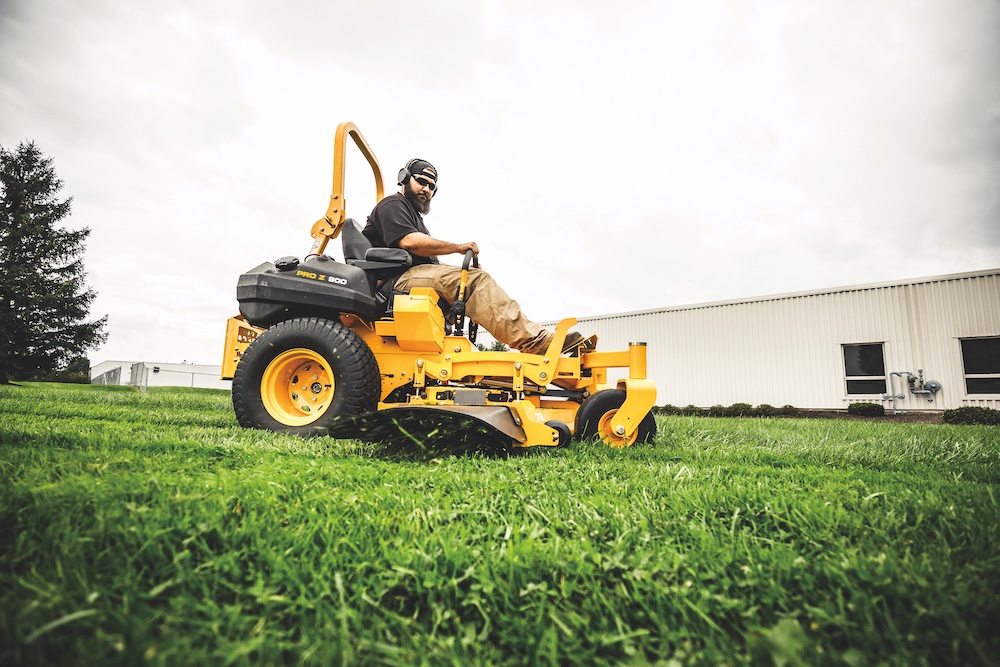 Types of Properties/Terrain – The most important factor to consider when buying a commercial lawn mower is where you’ll be using the mower. Will it be used on flat properties or sloped properties? What is the size of the properties? How many obstacles will you be regularly navigating? These details all factor into which machines are best for your business.
Types of Properties/Terrain – The most important factor to consider when buying a commercial lawn mower is where you’ll be using the mower. Will it be used on flat properties or sloped properties? What is the size of the properties? How many obstacles will you be regularly navigating? These details all factor into which machines are best for your business.
Engine Size – The ideal engine size for your commercial lawn mower depends on how and where you intend to use the machine. More power is required for the larger, tougher jobs so you’ll need a bigger engine if you’re handling those types of properties. With commercial-grade KOHLER® engines and KAWASAKI® engines up to 38.5 horsepower, Cub Cadet® PRO Z™ Series commercial mowers possess the power necessary to tackle tough jobs.
Deck Width – The larger the area your machine needs to mow, the larger the cutting deck width usually should be. For properties with an acreage of three or more, for example, a deck width of at least 50" is probably necessary. However, keep in mind that the type of terrain you’re mowing should also impact your decision on deck size: the bumpier the terrain, the harder it may be for a large-sized deck because it could get caught in bumps and ruts.
Cutting Performance – Commercial or residential, cut quality for any lawn mower is crucial. You want your machine to produce a consistent cut that creates fine clippings and few clumps, with excellent side discharge, mulching and bagging ability. How a cutting deck is designed is pivotal to performance and can make or break a job – Cub Cadet®’s deck design and maintenance-free spindles are designed to make your work quick and smooth.
Speed – You only move as fast as your mower. The top speeds of commercial zero-turn mowers depend on a multitude of factors including the machine’s weight, engine size, horsepower and transmission. For example, Cub Cadet® commercial zero-turn mowers range from top speeds of 7 mph (11.27 km/h) to 14 mph (22.5 km/h).
Durability – Your mower needs to be as tough as the work you’re doing. Do your homework on the key structural aspects of the machine you’re interested in buying, like the steel that makes up the frame, axle, rollover protection structure, bumper and yokes. What is the steel’s thickness? Is it fully welded?
Comfort – Comfort is key to productivity. You and your team will spend a lot of time on your commercial mowers so focus on features that provide comfort. Cub Cadet®’s large three-position spring suspension platform on our PRO X Series stand-on mowers, for example, is designed to allow the operator to fine-tune tension and glide comfortably over rough terrains.
Service & Support – Quality service and support is a necessity for any commercial lawn mower so it’s up and running every day. Before buying a lawn mower, ask how quickly you would be able to get the machine serviced in a pinch and how long it would take to get replacement parts.
Commercial Lawn Mower Accessories to Consider
You need a mower that’s as versatile as it is powerful. Here are a handful of accessories that might be worth adding on to your machine.
- Bagger – Collect grass clippings and other debris from lawns easily and efficiently. The custom-designed Cub Cadet® PRO PCS 1900 Three Bag Collection System features a 15-inch impeller, a reinforced tubular frame and metal handles on each bag for easy dumping.
- Mulching Kit – Finely cut grass clippings and redistribute them back into the lawn to provide essential nutrients.
- Power Deck Lift Kit – Raise and lower your cutting deck with the push of a button.
- Lawn Striping Kit – Create different patterns on lawns for a well-manicured appearance.
Commercial Lawn Mower Buying Advice
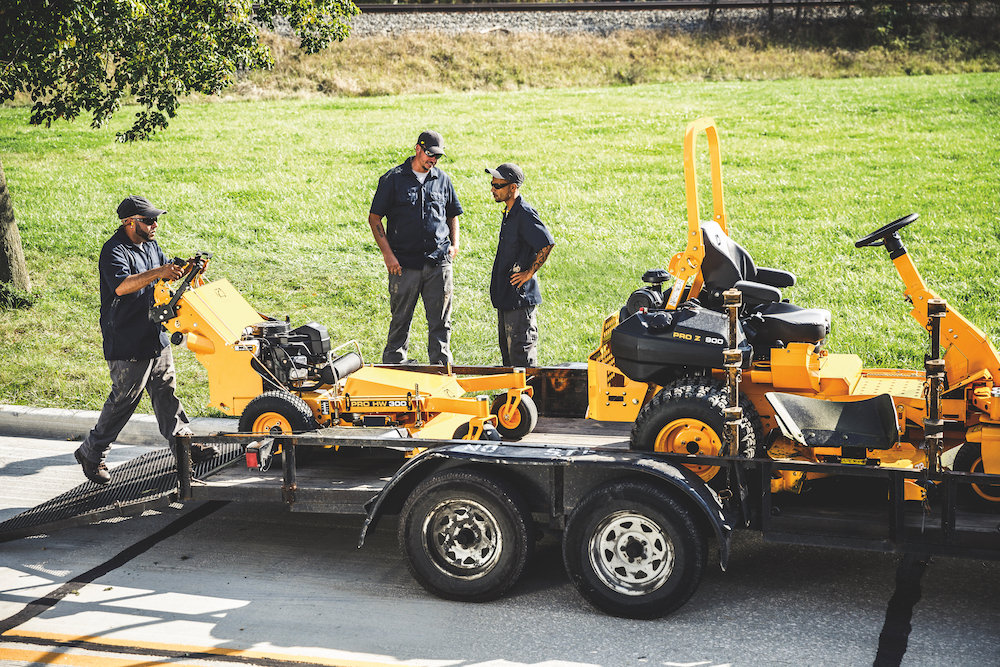 Buying a commercial lawn mower is about finding good value on the machine that fits your needs, which means you need to be asking the right questions.
Buying a commercial lawn mower is about finding good value on the machine that fits your needs, which means you need to be asking the right questions.
Here is a list five important areas to ask about before buying a machine for your business:
Request a Demo
If you’re buying a car, you want to give it a spin before driving it off the lot for good. The same is true for a commercial lawn mower. Prior to finalizing an investment this big, you should see the machine at work in person beforehand to make sure it’s what you’re looking for. Request a demo with the Cub Cadet® PRO team to help you get the lawn mower that fits your needs.
Financing Incentives
When buying a commercial machine, make sure you’re up to speed on financing options and other incentives available – 0% financing is the best option. Cub Cadet® offers a range of great financing options on commercial equipment at participating independent dealers.
Fleet Program
Ask about a fleet program or discount. These deals are usually offered to businesses buying more than one machine.
Warranties
Getting a strong and dependable warranty for your commercial lawn mower is an important consideration, with the number of years and hours the warranty covers being the big factors. The Cub Cadet® PRO lineup of commercial equipment is backed by a range of excellent options that include limited three-year, no-hour-limit machine warranties and limited five-year, 1,750-hour manufacturer deck shell warranties. Contact your local dealer for more details.
Frequently Asked Questions
What is the best commercial zero-turn mower for my needs?
Deciding which zero-turn mower is the best for your business hinges on what you need your commercial machines to do. The type of terrain you mow, the number of properties you maintain and the types of services you offer are all factors in determining which commercial zero-turn mower is best for you. Equipped with powerful Kawasaki® engines and fabricated steel deck shells, Cub Cadet® PRO commercial zero-turns are designed with professionals in mind.
Where is the best place to buy a commercial zero-turn mower?
Commercial lawn mowers are most commonly purchased from independent dealers, many of whom have ongoing business relationships with local professional landscapers. That means they’re familiar with the business and can provide high-quality service to each landscaper’s needs. Cub Cadet® has a network of service dealers across Canada who can offer financing options, select warranty and parts service, and expert knowledge to help you buy and maintain your business’s machines
Is a commercial zero-turn mower worth the money?
If you operate a landscaping business that handles multiple large properties or specializes in expert lawn care, a commercial zero-turn mower is likely a worthwhile investment. Cub Cadet® offers financing opportunities through independent dealers that can help make the initial cost of a commercial zero-turn easier to manage.
How long will a commercial zero-turn mower last?
How long your commercial mower lasts will likely depend mostly on how well the machine is treated and maintained. Getting optimal time and performance out of your commercial mower is helped by sticking to its recommended regular maintenance schedule (which can be found in the operator’s manual) and using certified parts when replacement is needed.
What is the top speed of a Cub Cadet® commercial zero-turn mower?
The top speeds of Cub Cadet® commercial zero-turn mowers range from 7 mph (11.27 km/h) to 14 mph (22.5 km/h), depending on a variety of factors including the machine’s weight, engine size, horsepower and transmission. The Cub Cadet® Pro Z 960 L KW, for example, can reach a top speed of 14 mph with 35 horsepower.
How steep of a hill can a commercial zero-turn mower handle?
The answer depends largely on the type of machine you buy. If you purchase a lap-bar zero-turn mower, for example, it’s recommended that you avoid steep hills and stick to predominantly flat properties. Zero-turns with steering wheel control, however, may be able to effectively mow hills up to a certain degree of incline depending on the model.
The Cub Cadet® PRO Z™ 972 SD, for example, can mow straight lines on slopes and hillsides up to 25 degrees.
How often should you service a commercial zero-turn mower?
It’s recommended that commercial zero-turn mowers undergo regular maintenance before each use, after mowing and at specific intervals throughout its life depending on the type of mower. Refer to your machine’s operator’s manual for a thorough breakdown of maintenance tasks you should complete regularly. For service that requires a professional, the Cub Cadet® nationwide network of dealers can provide expert service and support.
Commercial Lawn Mower Maintenance Schedule
Regular maintenance will help you get the most out of your commercial machine and can help extend its life. As a guide, here’s a recommended maintenance schedule for a Cub Cadet® commercial lawn mower. Refer to your operator’s manual for your machine’s specific maintenance schedule and for safety instructions.
Before each use:
- Check gasoline level
- Check hydraulic hoses for leaks
- Check tires and tire pressure
- Check deck, mower and hydro drive belts
- Check blades and blade tightness
- Check safety switches for proper operation
- Check fluid level in transmission oil expansion reservoir
- Check/clean engine intake screens & cooling fans
- Check/clean exhaust manifold, muffler pipe & muffler shields
- Check/clean top & underside of deck, under and around spindle cover & belt area
- Check/clean around fuses, wiring and wiring harnesses
- Check/clean around transmission, axle and fans
Every 25 hours:
- Grease three spindle bearings
Every 50 hours:
- Lubricate wear points
- Clean engine cooling fans & external surfaces
- Lubricate all grease fittings
Every 500 hours:
- Change hydrostatic fluid & filter in transaxles
After mowing:
- Check/clean engine intake screens & cooling fans
- Check/clean exhaust manifold, muffler pipe & muffler shields
- Check/clean top & underside of deck, under and around spindle cover & belt area
- Check/clean around fuses, wiring and wiring harnesses
- Check/clean around transmission, axle and fans
- Blow out/clean the pump control area under foot pan
- Blow out/clean the pedal control area under the foot rest
- Lubricate wear points